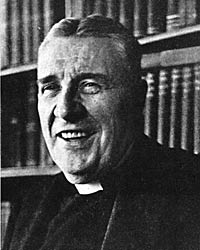Readings:
Psalm
130
Isaiah 51:17–52:1a
1 Corinthians
5:6-8
Luke 4:40-44
Preface of God the Holy Spirit
[Common of a Pastor]
[Common of a Missionary]
[For the Ministry I]
[For the Mission of the Church]
PRAYER (traditional language)
Holy God, we thank thee for the vision of Samuel Shoemaker, who labored for the renewal of
all people: Grant, we pray, that we may follow his example to help others find salvation through the knowledge and love of Jesus Christ our Savior; who with thee and the Holy Spirit liveth and reigneth, one God, for ever and ever. Amen.
PRAYER (contemporary language)
Holy God, we thank you for the vision of Samuel Shoemaker, who labored for the renewal of all people: Grant, we pray, that we may follow his example to help others find salvation through the knowledge and love of Jesus Christ our Savior; who with you and the Holy Spirit lives and reigns, one God, for ever and ever. Amen.
This commemoration appears in A Great Cloud of Witnesses.
Return to Lectionary Home Page
Webmaster: Charles Wohlers
Last updated: 2 December 2018
SAMUEL SHOEMAKER
PRIEST AND EVANGELIST, 1963
 Sam
Shoemaker, DD, STD (1893-1963), was an Episcopal priest who was instrumental
in the Oxford Group
and founding principles of Alcoholics
Anonymous. Dr. Samuel Moor Shoemaker was the rector of the Calvary
Church in New York City, which was the United States headquarters of the
Oxford Group. Bill Wilson
attended Oxford Group meetings at the Calvary Church and Sam was instrumental
in assisting Bill Wilson with the writing of the book Alcoholics Anonymous
(nickname: The
Big Book). Bill acknowledged this linkage when he wrote in the
book, A.A. Comes of Age (page 39):
Sam
Shoemaker, DD, STD (1893-1963), was an Episcopal priest who was instrumental
in the Oxford Group
and founding principles of Alcoholics
Anonymous. Dr. Samuel Moor Shoemaker was the rector of the Calvary
Church in New York City, which was the United States headquarters of the
Oxford Group. Bill Wilson
attended Oxford Group meetings at the Calvary Church and Sam was instrumental
in assisting Bill Wilson with the writing of the book Alcoholics Anonymous
(nickname: The
Big Book). Bill acknowledged this linkage when he wrote in the
book, A.A. Comes of Age (page 39):
In 1917, Sam Shoemaker had been sent to China to start a branch of the YMCA and to teach at the Princeton-in-China Program. There, in 1918, feeling discouraged, he first met Frank Buchman who told him of the four absolutes, honesty, purity and unselfishness and love. Later, Shoemaker would speak of the meeting as a major influence for the start of his ministry, that being the time when he decided to let go of self and let God guide his life
Bill Wilson, in 1955, would later give credit to Sam Shoemaker whom he referred to as a co-founder of AA.
" It was from Sam Shoemaker, that we absorbed most of the Twelve Steps of Alcoholics Anonymous, steps that express the heart of AA's way of life. Dr. Silkworth gave us the needed knowledge of our illness, but Sam Shoemaker had given us the concrete knowledge of what we could do about it, he passed on the spiritual keys by which we were liberated. The early AA got its ideas of self-examination, acknowledgement of character defects, restitution for harm done, and working with others straight from the Oxford Group and directly from Sam Shoemaker, their former leader in America, and from nowhere else."
Rev. Shoemaker wrote over thirty books, at least half of which were circulating before A.A.’s 12 Steps were first published in the Big Book in 1939.
Books by Shoemaker:
- Children of the Second Birth, 1927
- If I Be Lifted Up, 1931
- The Conversion of the Church, 1932
- Twice-Born Ministers, 1929
Shoemaker's contributions and service to Alcoholics Anonymous and as a minister of the Anglican Communion and Episcopal Church of America have had a worldwide effect. The philosophy that Shoemaker codified, in conjunction with Bill Wilson, is used in almost every country around the world to treat alcoholism.
— from Wikipedia
After leaving New York, Dr. Shoemaker served Calvary Church, Pittsburgh,
for ten years before retiring in 1961. He was known as one of the foremost
preachers of his day, with a regularly-scheduled radio program. He was
also instrumental in the rebirth of small group ministries in the United
States, which led to (among other things) the Pittsburgh
Experiment, and Faith at Work, both interdenominational program designed to bring Christianity
into normal daily activities. Finally, he was involved in the beginnings
of the Anglican Fellowship of Prayer,
actually started by his wife Helen in the 1950's.